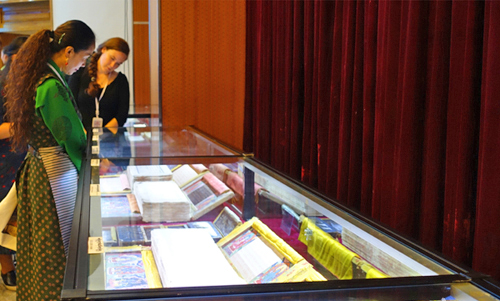Seminar charts course for future development in Tibet

Participants in the recent sixth Beijing International Seminar on Tibetan Studies peruse Tibetan documents dating back to the Ming and Qing dynasties from Beijing and Mongolian regions.
More than 300 specialists on Tibet from China and abroad recently gathered in Beijing to weigh in on the development of the ethnic autonomous region, share research achievements and coordinate further studies.
The sixth Beijing International Seminar on Tibetan Studies was held at the China Tibetology Research Center from Aug. 2 to 4. “The launch of the sixth Beijing International Seminar on Tibetan Studies offers a promising start for the development of Tibetan studies, prompting us to constantly innovate and push forward the cause,” said You Luoping, deputy director-general of the research center.
Launched in 1991, the seminar has become one of the largest gatherings for Tibet experts in the world, serving as an important platform for exchange and cooperation between domestic and overseas Tibet researchers.
The aim of the seminar is to preserve the cultural legacy of Tibet and encourage sustainable development in the autonomous region. About six to seven panels out of 19 focused on how to best serve Tibetan society.
Panelists exchanged views at sessions covering a wide range of topics, including “The ‘Belt and Road’ initiative and Construction of Important Passages for South Asia,” “Economic Growth and Comprehensively Moderate Prosperity,” “Social Transition and Changes,” and “Ecological Progress.”
Lian Xiangmin, director of the Institute of Contemporary Studies at the China Tibetology Research Center, said that the rule of law has facilitated innovations in management within Tibetan society.
Strengthening the rule of law, raising incomes, increasing cohesion and consolidating the basis for development have been the main priorities in the region since the 18th CPC National Congress. These guidelines lay the groundwork for all ethnic groups in the region to fully exercise their rights in the governance of Tibet, Lian said.
Those attending the meeting said that the cultural wealth of Tibet has been properly safeguarded and enriched in the 21st century.
Drawing on lessons learned throughout a long career of fieldwork, Colin Mackerras, an emeritus professor at Griffith University in Australia, said China has gone to great lengths to preserve the culture of ethnic groups—Tibetans in particular.
Although modernization is in full swing across the country, it will not destroy traditional culture, Mackerras said. He called claims by Western scholars that Tibetan culture is in crisis “groundless.”
In recent years, ecological progress in Tibet has come to the fore. Chen Wei, president of the Qinghai Provincial Academy of Social Sciences, said that Tibetan Buddhism contains a number of useful ethical precepts related to the environment. Chen suggested drawing on this aspect of the religion to guide Tibet on the path to sustainable development.
At its core, the ethical system of Tibetan Buddhism is built on nature worship, totemism and other primitive ecological concepts. Tibetan Buddhism encourages people to act as custodians of nature, and the religion reveres mountains, rivers, as well as all sentient animals, Chen said.
Research on Sanskrit transcripts was another highlight of the seminar. Chinese and foreign scholars submitted more than 20 quality papers on the subject.
Zeng Jiang is a reporter at the Chinese Social Sciences Today.
